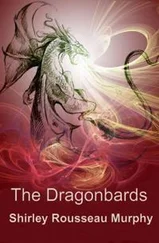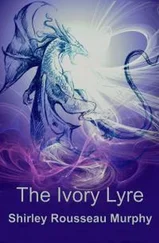She undressed at last down to her shift and strapped her scabbard of arrows across her naked shoulders, slung on her bow. The water, as she stepped in, was so cold it made an aching, stifling pain in her legs. Surely she had gone mad. She was soon over her head and swimming strongly; trying in desperation to control her panic. With each stroke, as her face went under water, she opened her eyes to stare about her in fear, but could see only dim shadows. Then, suddenly, when she looked up, it was dark. She was swimming through the night, stars overhead and Ere’s twin moons hanging low over the water, nearly full, reflecting like a second pair of eyes in the black water. There was no sign of land. Some distance ahead, a black tower rose up out of the water, a tall, unlighted tower, silhouetted against the stars. She swallowed, swam toward it, filled with fear.
When she reached the tower she began to circle it, swimming slowly, looking up. It reared above her like some ancient monster risen from unknown depths, hoary with water weed or with some vine that clung to its sides. At one place, high above her head, she could make out a protrusion like a thick door. When she thought she had circled the tower, she grabbed a handful of vines, tugged at them, found them strong, and began to climb, still following that instinctive Seer’s sense of inevitability; and following, too, the only way of escape from the icy water. She climbed until she was out of breath, then clung there shivering. Now she could see the black shapes of hills against the starry sky. There was no sound from within the tower. She pulled herself higher, came to a tiny window and stared in, could see a glint of white, but nothing more. She climbed again, half-naked, cold, wishing for her clothes, her lantern, her sword. Wishing herself home in Carriol, warm and safe in her bed.
She could see high above her a tiny balcony, hardly more than a ledge. By the time she reached it she was warmer, and her shift had begun to dry. She pulled herself up onto it and found she was facing a little barred window. When the wind hit her, she felt cold again. She huddled on the ledge and peered through the bars into the dim stone room. She could see nothing at first but a window directly across from her, where stars shone, a similar window to her left and another to her right. Four windows spaced equally around the circular room. Then she began to make out the room itself. A cot, a chest, a small table, a stool. There was a darker shadow across the cot, like a sleeping figure. As the moons rose higher, she could see the cot better. Yes, someone slept there, long pale hair spilling across the cover.
.The figure sighed and stirred, so her face was caught in moonlight. Skeelie’s emotions pitched, her fists so tight around the bars her knuckles went white. Telien? Was it Telien? Without meaning to, she breathed the name, harsh against the night’s silence.
The girl twisted up suddenly, with drawn breath, raised up to face the window; “Who spoke—who?” Slowly she put one bare foot from under the blankets onto the stone floor, then the other foot, almost as if she moved in a dream. She seemed unafraid—or perhaps beyond fear. She came hesitantly toward the window, peering against the faint moonlight. Then she caught her breath. “There is someone! I thought it was a dream. How . . .?” She stared at Skeelie, then reached out through the bars in a frenzy. “How did you . . .? Why, I know you! I remember! Skeelie? Is it Skeelie?” Telien knelt on the sill clutching Skeelie close, pulling her into the bars with more strength than one would think she possessed, pressing her face against Skeelie through the bars in an agony of need for warmth, for human contact. Skeelie touched the cold, thin cheek, felt deep hollows where there had been none. She held Telien against her through the bars for a long time while Telien cried silently, shivering. When Telien raised her face at last, the moonlight caught across little lines around her mouth and on her brow. Her hair was no longer golden, but as pale a color as the moons. Skeelie shuddered. How long had Telien been in this place? Why was she here? The girl’s confusion, her trembling emotion blurred any sense Skeelie might have taken from her, any answers she might have found.
At last Telien raised her face and stared at Skeelie’s near nakedness as if she had just perceived it. Then she rose and drew her blanket from the bed, thrusting it through the bars in a gesture that touched Skeelie terribly.
They had been close once, when Telien was first lost in Time and had cried out to her in spirit, had, in her tumbling frantic flight through ages, needed Skeelie badly. “I wished for you, Skeelie. For a long time after I could no longer feel you in my thoughts, I wished you would come back. But you never did. After a while I stopped wishing.”
“I could not. It—the power faded. How long has it been for you, Telien? How many years?” It was only days since Skeelie had left the caves of Owdneet, but surely Telien was years older. She could not understand the warping of Time.
“I don’t know how long. My—my baby was born four years after the battle at the Castle of Hape. I have been here nearly since then. I have lost count of years.”
“Your—baby?” Skeelie’s voice trembled. Whose baby? Ram’s baby?
“My baby . . .” Telien’s eyes were dark and huge with her sadness. “I don’t want Ram ever to learn of my baby. I—could not face Ramad now. My baby is the child of the dark Seer, Skeelie. The child of NilokEm, who escaped from the battle at the Castle of Hape. My child—my child has the blood of the dark Seers.
“Ni-NilokEm brought me to him out of Time, I do not know how. I was suddenly standing in the garden of his villa. He . . . I bore NilokEm’s child, and then—then my baby was taken from me.”
“How long ago was that?”
“I don’t know. It was winter when NilokEm locked me here. I think—perhaps four more winters have passed since then. Four winters. It is fall now, I can see color changing on the hills. I lived in his villa for more than a year. Six— six years, then, since I first stood in the garden of NilokEm’s villa, terrified of him.”
Six years. Skeelie’s head spun. How could the number of days each had lived since they left their own time be different? Six years for Telien, a matter of days for herself.
“Six years since Ramad held me on that windswept mountain. Six years since the huge trees turned suddenly to small saplings, and then we were torn apart. I was alone, Ram was gone in that dark, terrible storm of Time. I have tried not to remember. When that wild storm stopped and all was still, I was in an elegant courtyard, and a man stood watching me, a tall, thin man, stooped, with pale skin and thin dark hair. He terrified me, his look—I knew he was a Seer. I was so afraid of him, I turned to run and saw the gates were bolted with great iron locks. I turned again and would have run through the rooms where a side door opened, but he grabbed me and held me, and . . .
“He—he knew my name without my telling him. He took me to wife.” She turned her face away. “I hoped Ram would come, would find me. I was kept locked inside or, if I was let to go about the grounds, I was guarded. I tried to make friends with the guards, hoping they would help me. I had nothing to bribe them with. They were not friendly, they were afraid of NilokEm. I tried to slip back into Time, but I did not know how. I carry the starfire still, but I do not know how to use it. It confuses and upsets me. I have no Seer’s powers. I have never known what its power was, but I kept it hidden from NilokEm. I thought sometimes he sensed its power but didn’t know what he sensed. I was a prisoner, more confined than when I was watched so constantly in my father’s village. I have never understood why NilokEm wanted me, why he called me out of Time. I would not want to see Ram now. But . . . Is Ram safe?”
Читать дальше
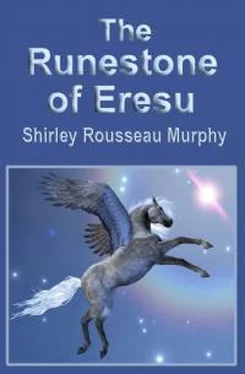





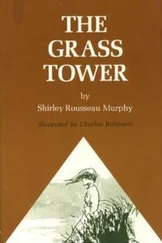


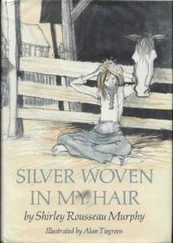
![Ширли Мерфи - The Shattered Stone [calibre]](/books/436059/shirli-merfi-the-shattered-stone-calibre-thumb.webp)
